Trump-Kim summit: The sorry fate of North Korea's diplomat defectors
- Published
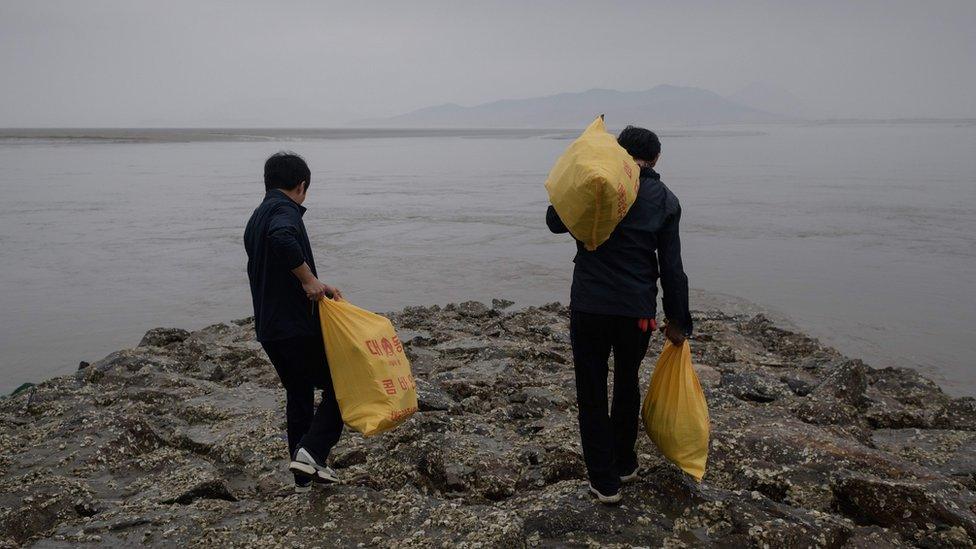
North Korean defector activists like to float supplies with news of the South towards the North - increasingly something of a dilemma for the authorities in Seoul
North Korean leader Kim Jong-un is about to attend his second summit with US President Donald Trump. But as the North inches its way out of near-total isolation and tentatively engages with the world, the question of what to do about high-profile North Korean diplomatic defectors becomes that much thornier.
It can't be easy. Deciding to defect from North Korea can put your life and those you love in danger. For Pyongyang's diplomats, who have enjoyed a life of prestige and power, the danger in defecting is that much more real.
These men and women are the Juche ideology foreign front line.
Their main role is to raise capital for the regime, but although they are the elite in their home country, they are unlikely to receive such a privileged position anywhere else. Ambassadors and their staff are told to promote Pyongyang's point of view around the world, and will often seek out pro-North Korean groups in their respective countries. They also monitor local news, screening TV networks and newspapers for any mention of the Kim family.
The latest development comes from Italy, where the government has expressed concern about the fate of the school-age daughter of Jo Song-gil, the North Korean ambassador to Italy who fled his home in Rome last year. Another high-profile diplomatic defector, Thae Yong-ho, had told reporters he understood she was forcefully repatriated back to Pyongyang.
The ultimate traitors
It's almost impossible to verify such claims but it does set out just how high the stakes are, particularly for defectors who come from an elite so privileged they are trusted enough to represent the country abroad.
The higher your prestige, the higher the risk in leaving. Such a move is unlikely to be forgiven by the Kim regime - some elite defectors say they discovered that their families back in North Korea were punished, sent to prison or, in some cases, they believe members of their families were shot.
They are global ambassadors for the Kim family, the figures who hold up the interests of the dynasty, in the face of an often hostile world. So it stands to reason - by Pyongyang logic - that dissent while working as a diplomat cannot be tolerated or even be seen to be tolerated.
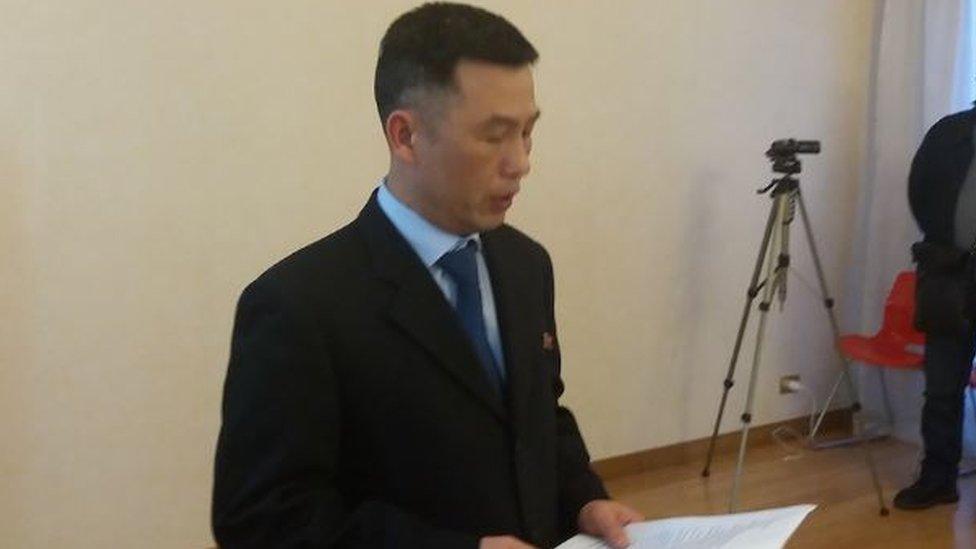
Jo Song-gil was thought to have been living in Rome with his wife and children before he disappeared
North Korea views diplomatic defectors as the ultimate traitors - because the humiliation is that much starker for the Kims. And yet it happens.
Han Jin Myung was a second secretary in Vietnam and told NK News, external that he defected after failing to share with ministry officials the money he made from selling some items. He said diplomats were not paid well, and he received around $400 (£348) a month. His seniors reported him to Pyongyang and he felt he was in danger. He said he was certain he would be severely punished and quickly made the decision to leave.
'South Korea must embrace North Koreans'
Diplomats who spend time abroad have been allowed to see how other countries live and work. They have gained a taste of another life; their children may have spent time at international schools. This glimpse of freedom may give them a taste for more.
Despite the latest claims about the fate of his daughter, information is still scarce about the 48-year-old Jo Song-gil and his family. They were last seen in late November and are thought to be seeking asylum in a third country - some believe he's on his way to the United States. The details of this case remain murky and we may yet find out more about what has really happened.
But these high-profile defectors also raise something of a dilemma for South Korea, particularly at a time it is forging a cautious camaraderie with the North.
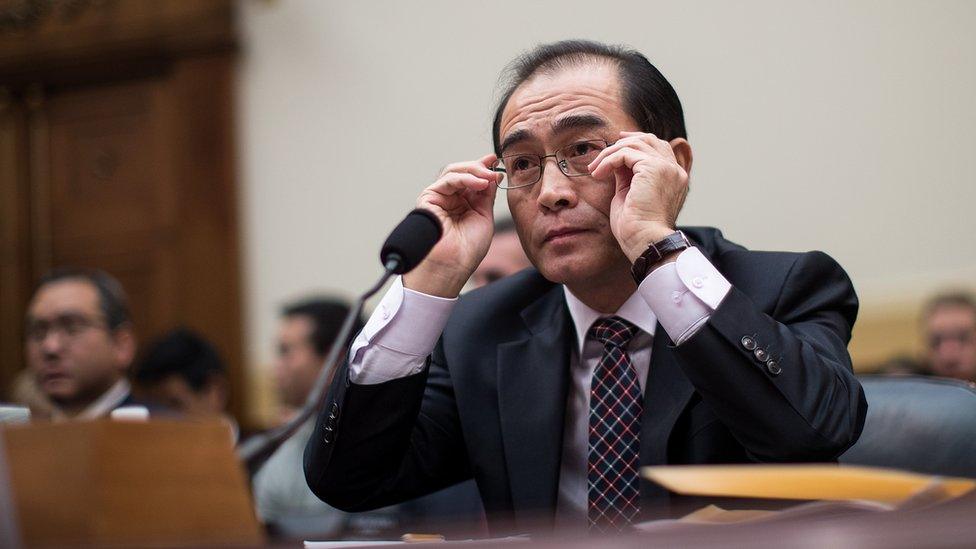
Thae Yong-ho was North Korea's deputy ambassador to Britain
Here in South Korea, such defectors have historically been given protection and for good reason. Yi Han-yong, a nephew of Kim Jong-un's half-brother, was shot dead outside his home in a suburb of Seoul in 1997 after publishing a book about the Kim regime. His attackers were never caught.
The former deputy ambassador to London, Thae Yong-ho, who defected in 2016, told reporters that he felt the South Korean government should be more proactive - but he no longer believed Mr Jo should seek shelter in the South.
"South Korea needs to show that it is willing to embrace North Koreans," he said in a press conference.
"But the current situation doesn't seem to do that. Neither the South Korean government nor its citizens express their intention to rescue Jo and his family after their defection, and I'm saddened by the current situation."

"We need to tell North Korean citizens that the Republic of Korea is their motherland. And Korea would welcome any North Korean citizens who would want to come to this country."
But the warmth of the welcome in the South is not guaranteed. Conservative governments have often used defectors to tarnish the North's image and highlight its human rights abuses.
But in contrast, the liberal President Moon Jae-in is pursuing a policy of engaging with the North and his administration may be wondering what line to take.
The South has long held the ideal that all Koreans are entitled to political and economic freedom. But the North often accuses Seoul of orchestrating these defections to undermine and embarrass them. This is not the kind of argument Mr Moon's government wants to have right now.

Pyongyang's Foreign Ministry does not hide its outrage and disgust at those who speak out, such as Thae Yong-ho.
Although not specifically naming him, they described him as "human scum" and were critical of the South Korean government for allowing him to speak at the National Assembly.
We asked Seoul's Ministry of Unification and the Foreign Ministry about concerns that North Koreans were not being embraced.
The Ministry of Unification spokesperson was very careful about the wording of the statement and said its position was that it "will accept all North Korean defectors who wish to come to the South of their own free will".
Seoul does provide material assistance to North Korean refugees. There are now nearly 32,000 who have made the perilous journey to South Korea. They are aided in their new lives, offered a place to live and and education.
But the Ministry of Unification seems to be concerned about how defectors' actions are perceived in the North.
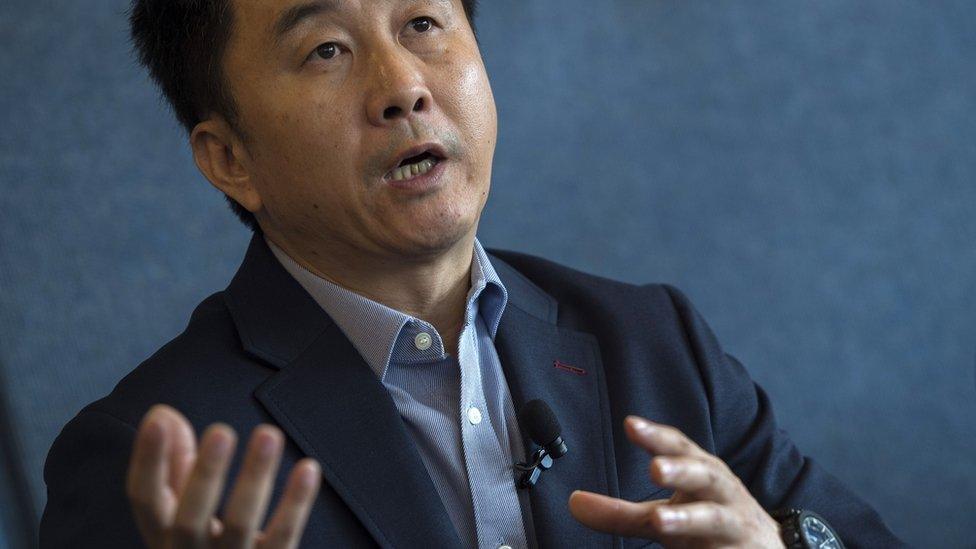
North Korean defector Kang Chol-Hwan talks to an American audience about his experience
Last year, just days after the first meeting between President Moon and Kim Jong-un, one politically active defector was preparing to launch balloons into the North with brochures and flash drives. He has done this for 15 years. But he said he received a call asking him not to.
When the group decided to go ahead with the balloon launch, they were surrounded by police.
Kim Myong Song, a North Korean defector who is a journalist for one of South Korea's biggest daily newspapers, the Chosun Ilbo, was barred from covering an event at the truce village of Panmunjom. It has been his job since 2013 to cover North-South affairs, but the Unification Ministry said it had to take "necessary steps" because of the "special circumstance" of this meeting.
"It hurts me," he told the BBC.
"Defectors are South Korean citizens. We left an oppressive dictatorship and came to South Korea, placing all our trust on the democratic South Korean government. However, this government decided to exclude a defector journalist even when the North Korean government did not make a request.
"It makes me feel vulnerable and fear that South Korean government may disown us if it is necessary and they will not come to protect us."
Potential mine of information
And yet there are benefits to welcoming North Korean defectors, particularly those that come with links to the rulers of the country.
A rare instance of a defector fleeing through the demilitarised zone was captured on CCTV in 2017
Kim Jeong-bong, the former chief director of Seoul's Institute for National Security and Strategy, told us that right now, Jo Song-gil would be a mine of information.
"We can learn from Jo about the explanation North Korea has given for its recent diplomatic strategy and what kind of orders it has given to elite diplomats in regards to the last three South-North summits, and the US-North summit," he said.
"It is possible that Kim Jong-un told his diplomats that he is trying to work with South Korea to gain economic support, or he may have said that he will never give up nuclear weapons even if he is are engaging with US.
"Especially with Jo. His father and father-in-law were both high level diplomats. His father-in-law was a foreign ministry ceremonial secretary, which means he was sitting next to Kim Il-sung and Kim Jong-il when they were meeting international leaders. It is possible if Jo comes to South Korea, we can fit the pieces of the puzzle together and fill in the gaps of 70 years of North Korean diplomatic history."
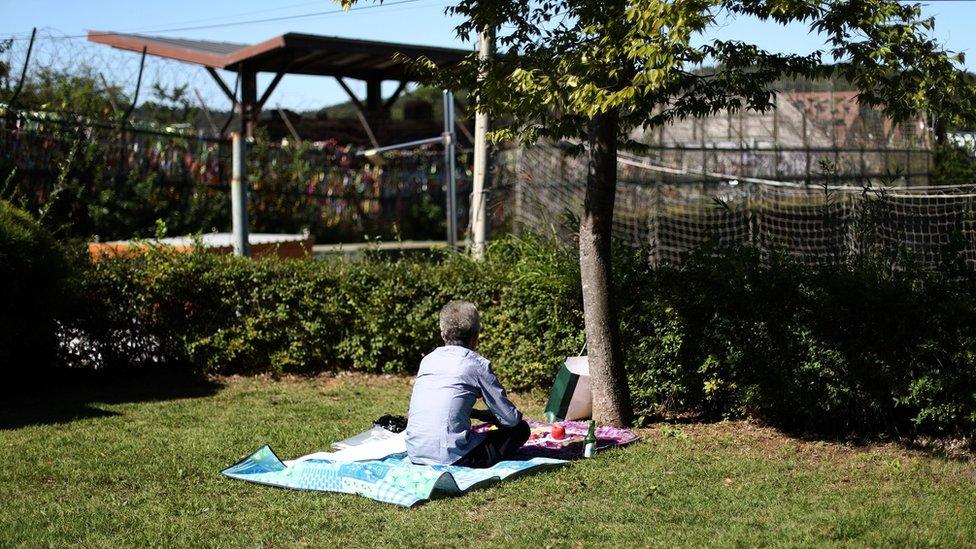
A North Korean defector pays respects to his ancestors in the North, during Thanksgiving Day. Many leave behind relatives who are at heightened risk for being connected to a defector
Mr Kim believes Mr Jo has gone to the United States and we are unlikely to hear more about his case for some time while Washington and Seoul are in talks with Pyongyang.
"It is very possible that US won't make any statement about it. When Chang Sung Gil, the Egypt ambassador, and his brother Chang Sung Ho, at the North Korean trade mission in France, went to the US, it kept its silence.
"It is highly likely Jo's case becomes like that."
With a second summit between the North and the US just days away, many will consider that a prudent approach.
- Published27 December 2016
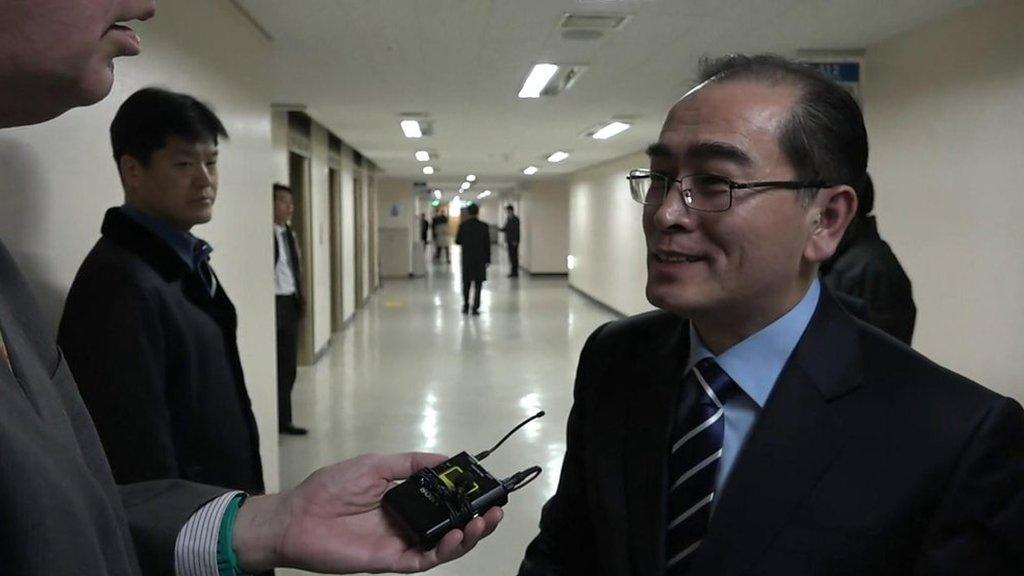
- Published22 November 2017
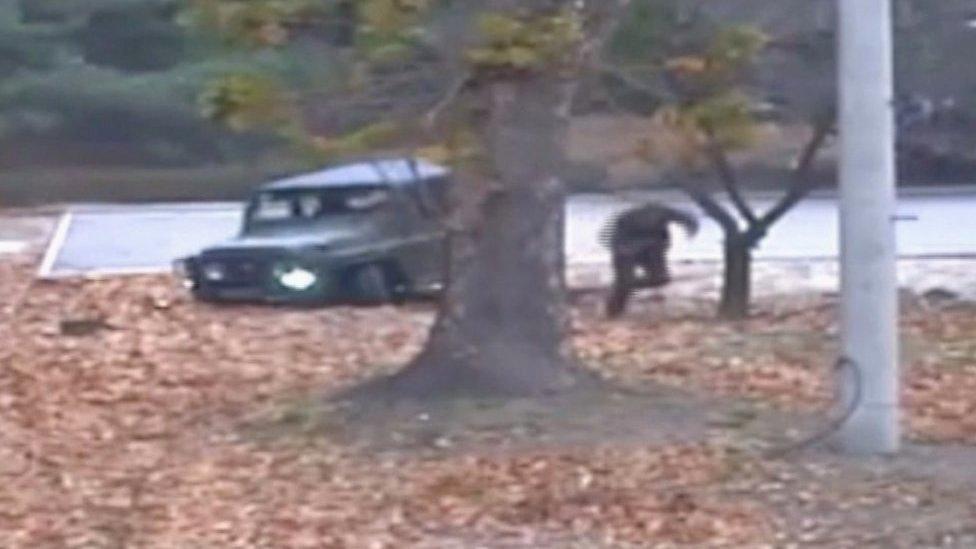
- Published30 September 2018
